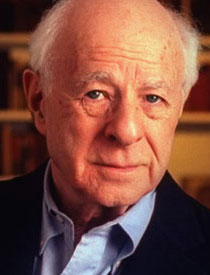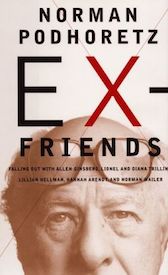Ex-Friends
If I wish to name-drop,” writes Norman Podhoretz, the author and former editor of Commentary, at the beginning of this book, ”I have only to list my ex-friends.” His crack is a tribute both to the eminence and to the contentiousness of the circle in which he spent the early part of his adult life: the generation of New York intellectuals whom Murray Kempton nicknamed ”the Family,” which flourished as a group from the late 1940’s to the late 1960’s. They were drawn together by a common interest in politics, culture and their own intelligence, and even after the bitterest internecine quarrels they kept track of one another’s work and opinions. For as Podhoretz notes, ”Who else cared so much, or even at all, about the issues” that agitated them? Only the simultaneous stresses of the Vietnam War and the counterculture were sufficient to drive them apart. ”Ex-Friends” is a tally sheet on six of Podhoretz’s former dancing and sparring partners: Allen Ginsberg, Lionel and Diana Trilling, Lillian Hellman, Hannah Arendt and Norman Mailer.Readers who know Norman Podhoretz as an unrelenting controversialist will be surprised by how often he relents here. Though he judges his subjects as thinkers and people and finds them wanting, he also recollects them with affection and amusement (even amusement at his own expense). Indeed, his chapters on the Trillings and Hannah Arendt are muffled by his lingering respect. He writes that ”the sheer intellectual excitement” of reading Arendt’s ”Origins of Totalitarianism” ”was similar to the esthetic pleasure that I derived as a literary man from a great poem or a great novel.” But at this late date, and despite his best efforts, Arendt comes across as an arid logic chopper. The literary critic Lionel Trilling, with whom he studied at Columbia, still looms in his mind as a mentor, and perhaps as an image of someone on the road not taken.
It was at Columbia that Podhoretz met Allen Ginsberg, who was another student of Trilling’s. Although Podhoretz was ”impressed” by the rhythms and phrasing of Ginsberg’s early Beat poems, he was repelled by their hymns to madness. ”The crazy people I had known . . . were cut off in the most frightening ways from themselves and the world around them,” Podhoretz writes. ”Drafting such pitiable creatures into the service of an ideological aggression” against bourgeois life struck him as ”heartless nonsense.” These criticisms tapped a vein of fury in Ginsberg, which erupted in a late-night encounter with Ginsberg and Jack Kerouac in Greenwich Village. ”We’ll get you through your children!” was Ginsberg’s parting howl. Disconcertingly, Podhoretz found Kerouac, in whose writing he saw no virtues whatever, ”easygoing and charming.” Years later, a mellower Ginsberg announced that he had decided Podhoretz had been a lifelong foil and stimulant to him, and hence ”a sacred object” on his mental horizon, but Podhoretz declined to acknowledge the honor.
Podhoretz’s relations with Lillian Hellman were for a time much warmer, though he and she were scarcely more alike than he and Ginsberg. He did not like her writing, her self-dramatizing or her chronic Stalinism, lingering through the late 50’s and early 60’s like a low-grade fever. Yet all these reservations melted in the glow of her personality: ”playful, mischievous, bitchy, earthy.” When they went to movies together, he explained the plots, which she could never follow. She called him ”Normie” and gave him a taste of glitz and glamour, showing up at his apartment with friends like William Wyler in tow. It sure beat discussing the origins of totalitarianism. At the end of her life, and long after the controversies of the late 60’s had driven them asunder, he caught a last view of her, being carried in her decrepitude from a car into her apartment building, and felt ”a powerful impulse to run over and plant a kiss on her forehead.” But he knew that if he had, she would have told him to get lost.
Norman Mailer serves as the focus of Podhoretz’s strangest relationship and his best chapter. For many years, Podhoretz was Mailer’s critical outrider, acclaiming his literary gifts at a time when the rest of the Family was reluctant to hail the author of a best seller (”The Naked and the Dead”). He was less impressed with Mailer’s ideas: ”To me this Harvard graduate seemed strangely uneducated (what on earth had they taught him there?), sounding like one of those autodidacts who used to roam around Greenwich Village spouting . . . conspiratorial theories.”
Mailer, meanwhile, acted on Podhoretz as a magnet of hipsterism. Under Mailer’s influence, he went to a pot party, where everyone else seemed to be listening to the music of the spheres through ”invisible headphones” (all he felt was ”a slight buzz”). He was also inspired to attend an orgy, populated entirely by strangers, which was ”a total and humiliating disaster” for him. Mailer told him sternly that this had been ”a concentration-camp orgy” and tried to set up a more welcoming one, without success. They began to drift apart when Mailer demanded to write a column in Commentary in which he would offer his thoughts on the Hasidic tales collected by Martin Buber. Podhoretz was not enthusiastic, and the column had a short run, though the two did attend a Yom Kippur service presided over by Menachem Schneerson, the Lubavitcher Rebbe, as research.The general failing of Podhoretz’s ex-friends, and of most of the Family, was pride. Sensibility and brains, they believed, gave them access to a realm of arcane and specialized perceptions, which their fellow citizens were too obtuse to share or appreciate. Because they understood Karl Marx and T. S. Eliot and jazz, they were above the common herd. Podhoretz has his own twinges of pride: he writes as if the neoconservatives, those Family members who reacted to the late 60’s by moving right rather than left, supplied Ronald Reagan with everything he needed to think about Communism, although Reagan often said that the writer who most influenced him was Whittaker Chambers. Yet Podhoretz, midway in his career, forswore the Family’s sense of superiority and decided that such quotidian realities as American life and Israel’s existence were worth defending with all one’s resources of heart and wit. This decision, and not any quirks of manner, was what drove him finally from the Family’s ranks and away from his old friends.
He nevertheless misses their argumentative days together. ”We now have ‘policy wonks’ by the thousand, but we have only a handful of thinkers who are willing and able to examine and critically debate” their assumptions. ”Without such a community” as the Family, America lacks ”a center around which we can gather and in which, whether through collaboration or competition, agreement or dissension, we can deepen and refine our thinking.”
Is this true? Podhoretz does not make the case. Most of the Family members were critics, not creators; the currents of political and artistic life flowed around them, not through them, and to the extent that they made a contribution, Podhoretz often believes (as in the cases of Ginsberg and Mailer) that it was pernicious. But certainly it was a rigorous and stimulating experience to be among them. Bliss was it in that crowd to be alive — an experience ”Ex-Friends” conveys supremely well.
Book Review from The New York Times, by Richard Brookhiser
Tags: Ex-Friends, Norman Podhoretz
- The Author

Norman Podhoretz
Norman Podhoretz is an American neoconservative pundit and former editor for Commentary magazine. A native of Brooklyn, Podhoretz received undergraduate degrees in […] More about Norman Podhoretz.














